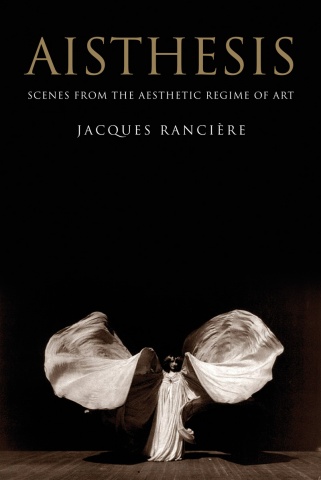Jacques Rancière: Aisthesis: Scenes from the Aesthetic Regime of Art (2011/2013)
Filed under book | Tags: · aesthetics, art, art history, art theory, body, cinema, dance, film, life, literature, music, painting, pantomime, philosophy, photography, poetry, politics, representation, sculpture, theatre, theory

Rancière’s magnum opus on the aesthetic.
“Composed in a series of scenes, Aisthesis–Rancière’s definitive statement on the aesthetic–takes its reader from Dresden in 1764 to New York in 1941. Along the way, we view the Belvedere Torso with Winckelmann, accompany Hegel to the museum and Mallarmé to the Folies-Bergère, attend a lecture by Emerson, visit exhibitions in Paris and New York, factories in Berlin, and film sets in Moscow and Hollywood. Rancière uses these sites and events—some famous, others forgotten—to ask what becomes art and what comes of it. He shows how a regime of artistic perception and interpretation was constituted and transformed by erasing the specificities of the different arts, as well as the borders that separated them from ordinary experience. This incisive study provides a history of artistic modernity far removed from the conventional postures of modernism.”
First published as Aisthesis : Scènes du régime esthétique de l’art, Éditions Galilée, 2011
Translated by Zakir Paul
Publisher Verso Books, 2013
ISBN 1781680892, 9781781680896
304 pages
via falsedeity
Reviews: Hal Foster (London Review of Books), Joseph Tanke (Los Angeles Review of Books), Marc Farrant (The New Inquiry), Ali Alizadeh (Sydney Review of Books), Jean-Philippe Deranty (Parrhesia).
Roundtable discussion with Rancière at Columbia (video, 43 min)
Selected interviews and reviews (in French)
Isaiah Berlin: Against the Current: Essays in the History of Ideas (1980)
Filed under book | Tags: · enlightenment, history, history of science, humanities, knowledge, philosophy, politics, science

“In this outstanding collection of essays, Isaiah Berlin, one of the great thinkers of the twentieth century, discusses the importance of dissenters in the history of ideas–among them Machiavelli, Giambattista Vico, Montesquieu, Alexander Herzen, Georges Sorel, Verdi, and Moses Hess. With his unusual powers of imaginative re-creation, Berlin brings to life original minds that swam against the current of their times.”
Edited and with a Bibliography by Henry Hardy
With an Introduction by Roger Hausheer
Publisher The Viking Press, New York, 1980
ISBN 0670109444
394 pages
Reviews: Mark Lilla (New York Review of Books), James G. Hanink.
PDF (50 MB, updated on 2016-12-23)
Comment (0)Francis Spufford: Red Plenty: Inside the Fifties’ Soviet Dream (2010)
Filed under book | Tags: · 1950s, 1960s, communism, cybernetics, economy, engineering, history of computing, mathematics, politics, science, soviet union

This book is about the moment in the mid-20th century when people believed that the state-owned Soviet economy might genuinely outdo the market, and produce a world of rich communists and envious capitalists. Specifically, it’s about the last and cleverest version of the idea – central planning via cybernetics – and about how and why, in the 1960s, it failed. To give the economics some human depth, Red Plenty generates a miniature Soviet Union on the page, peopled by scientists and politicians, fixers and managers, dreamers and cynics.
Publisher Faber & Faber, 2010
ISBN 0571269478, 9780571269471
356 pages
EPUB (updated on 2019-11-20)
See also:
Red Plenty Platforms, essay by Nick Dyer-Witheford, Culture Machine 14, 2013
Red Plenty: A Crooked Timber, collection of essays inspired by the book, 2012

